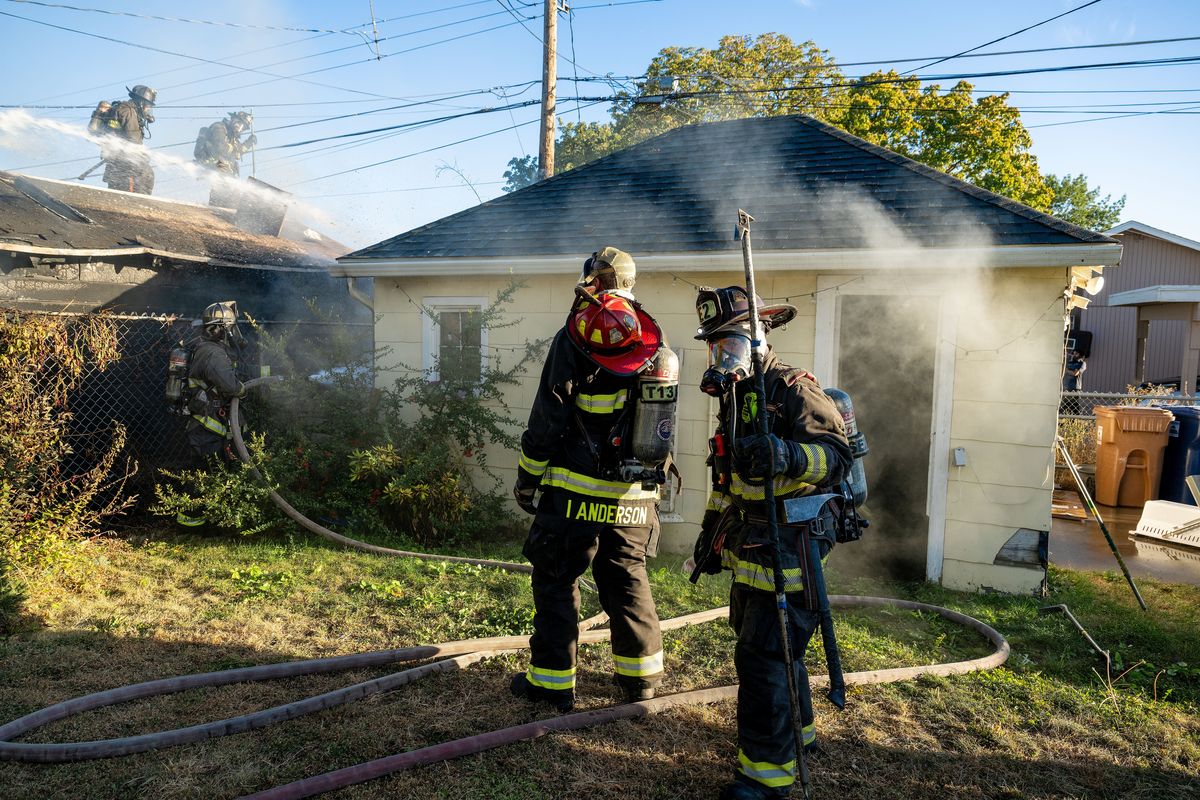Regional dispatch system kicks out Spokane Fire Department as talks on taking police calls collapse
Members of the Spokane Regional Emergency Communications board speak at a news conference on Thursday about the collapse of talks with the city of Spokane about SREC starting to dispatch for the Spokane Police Department. Left to right are Spokane Valley Fire Chief Frank Soto Jr.; Spokane County Sheriff Nowels; Spokane County Fire District 3 Chief Cody Rohrbach, who is the SREC board chairman; Spokane Valley Police Chief Dave Ellis; and Airway Heights Police Chief Brad Richmond. (Garrett Cabeza/The Spokesman-Review)
A long-debated proposal to bring the city of Spokane fully into the regional 911 dispatch system collapsed this week with the Spokane Regional Emergency Communications board voting to end negotiations and to kick out the city fire department.
Unless the decision is reversed, the Spokane Fire Department will be removed from the regional dispatcher by Jan. 1, 2026, and will join the Spokane Police Department – the only relevant agency in the county not already a part of SREC – in a separate, city-only dispatch system.
Both sides on Thursday blamed the other’s obstinacy for the failed negotiations, with city officials arguing SREC leadership had placed unfair deadlines on an agreement and refused a neutral arbitrator to sort through their disagreements, while SREC leadership posited that the city had dragged its feet and sought an arrangement that benefited Spokane over its regional partners.
Two Democrats on the County Commission, who are in the minority on the five-member commission, urged SREC to resume negotiations with a neutral party, as suggested by the city.
Contentions over how much authority the city should have on the regional board and over user fees had been the major point of friction preventing an agreement.
City spokeswoman Erin Hut noted that SREC leadership had proposed giving Spokane at most three seats on a ten-person board, despite nearly half of the taxes funding the regional dispatcher coming from within city borders.
“As the jurisdiction that has the most calls, needs the most resources and puts the most money into the system, we felt the representation should be larger,” Hut said.
Spokane County Sheriff John Nowels told reporters Thursday at a news conference that previous city administrations have been involved in developing the composition of the SREC board, but for some reason, this composition became untenable to the administration of Spokane Mayor Lisa Brown.
Nowels said he and the county commission told the city from the beginning that changing the composition of the board was not up for negotiation, but the city continued to bring it up.
He said the board believes each SREC agency should have an equal voice on the board, so everyone’s needs are met.
“We believe that is the most effective regional model and we have proven that over the last five years,” Nowels said.
Spokane officials have also balked at the size of user fees that SREC had wanted to charge the city for handling its calls, arguing it overcharged residents who were already paying into the system with their sales taxes. The city does generate a disproportionate amount of the region’s 911 calls – around 55%, estimated Deputy City Administrator Maggie Yates, who said the city was not totally opposed to some user fees to cover the difference, but had questions on the size and how they were to be determined.
Conversely, SREC leadership on Thursday argued that the board had “worked diligently” with the city to answer its questions and assuage its concerns but “despite these efforts, key City officials have shown reluctance to fully embrace regional collaboration,” the board wrote in a news release.
Spokane County Fire District 3 Chief Cody Rohrbach, SREC board chairman, said at the news conference that Thursday’s recommendation to the Spokane County Commission was not made lightly, but new projects, including relocating SREC operations next year to a new facility in Spokane Valley, require a decision from the city of Spokane whether it will be part of its new plans.
“We had these approaching deadlines and we recognized that they were very real, operational and financial impacts to our community if we didn’t make a decision,” Rohrbach said.
Nowels expressed his frustration with how discussions over the last five years have proceeded.
He said a regional system requires partners who trust each other in words and “deeds,” and current and past Spokane administrations have expressed concern about joining SREC.
“I think they have been very clear from the start that they have doubts as to our financial modeling irrespective of whether we have shown it to be successful or not,” Nowels said.
He said SREC has proven to be a successful model financially and in delivering quality professional services to its residents.
“This comes down to a disagreement on how tax dollars should be allocated and who should control what at the best interest of the participating agencies,” Nowels said.
A bill introduced Monday in the state Legislature by Spokane Democratic Reps. Timm Orsmby and Natasha Hill, narrowly tailored to benefit the city of Spokane if it joined the regional dispatcher, further soured relations between the various entities.
Because of its geographic and population scope, the proposed state law would have only applied to Spokane County.
Drafted prior to SREC board’s vote to stop considering enveloping City of Spokane services, the bill would require Spokane County to pay a portion of collected taxes earmarked for dispatch to the City of Spokane to fund their emergency service dispatch.
“What we have here is a city and state working together and letting the county know they can do more,” Hill said in an interview. Prime sponsor Ormsby could not be made available for comment on Thursday.
“Why isn’t the county taking care of the city?” Hill asked, adding that the city has the largest concentration of people in the county.
Nowels took issue with the bill, saying city leaders want to take tax dollars from Spokane County residents who live outside the city of Spokane and put them into the city, Nowels said.
“You are going to have representatives that have the majority over in Olympia making decisions about how tax dollars inside Spokane County, but outside of the city of Spokane, are used to subsidize emergency communications and operations inside the city of Spokane,” Nowels said. “That is unethical. It is absolutely unethical behavior by state representatives to craft legislation like that … The public needs to understand how serious that is and there should be consequences for that kind of behavior.”
Spokane Fire Department leadership expressed alarm Thursday following the announcement, stressing the benefit to the region of having seamless communication between the region’s fire fighting agencies. The city fire department has been a part of SREC since 2022.
In a press release, department officials argued that fragmenting the system risks miscommunication and delays and would impact response times as agencies respond to fires in each others’ jurisdictions.
“We are deeply concerned by this sudden decision,” said Spokane Fire Chief Julie O’Berg in a written statement. “The safety of our community is our top priority, and this proposed disruption to our communication system could have serious consequences during critical incidents.”
In a brief interview, Spokane Police Chief Kevin Hall held out hope that the board’s decision, which he said needed the county commission’s approval to be final, could still be reversed.
“I still think there might be a way forward to come to the table and address this,” Hall said. “The city certainly wasn’t, from my perspective, done trying to negotiate a fair and just agreement with SREC, so we would have the level of service we would need for our policing dispatch and to … ensure everyone was receiving the treatment and services needed.”
He noted that, though the city fire department had been integrated with the regional dispatcher for two years, the police department’s needs differed significantly.
“Fire dispatch is very regimented. They have national standards, and most fire departments operate exactly the same as their neighbors,” Hall said. “Police departments are not the same. They have different policies – urban policing is very different than rural policing – there’s a lot of differences between the disciplines.”
Hall, who was hired as police chief five months ago, acknowledged that he was not privy to the more than five-year history of negotiations between the city and its potential partners and added that he understood SREC leadership may have “felt they had spent enough time on this and wanted to move forward.”
“I understand there’s some history here and emotions involved, but I hope we can still continue forward,” Hall said.
But he also argued that regional law enforcement agencies stood to gain the most from a partnership.
“It seems more frequently that we go outside the city to help other agencies as opposed to them helping us,” Hall said.
Nowels said the city is welcome to rejoin discussions to join SREC but acknowledged it could be extremely disruptive if they wait too long because SREC is moving forward with its projects as if the city is not part of the regional 911 communications system.
Nowels assured residents that Thursday’s recommendation will not negatively affect first responder services in the city and county.
“I have full faith and confidence that the city of Spokane will be able to independently provide 911 emergency communications to their citizens and we will continue to do the same for those served by SREC,” Nowels said.

